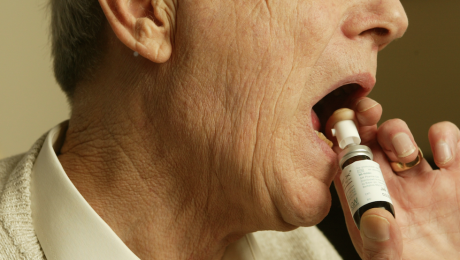Cannabis Medicine Helps A Pensioner

An Irish pensioner who suffers from multiple sclerosis (MS) has spoken about how a cannabis-based medicine has changed his life.
The 81-year-old former police officer, who lives in a rural part of the Omagh district is understood to be have been the only person in the Western Trust to have been prescribed the drug Sativex.
John (not his real name) said the oral spray has changed his life. He has called for the treatment to be funded for other MS sufferers.
“It has changed my life considerably. It definitely worked for me and I recommend it to anybody in the same position.”
Made from two different strains of cannabis, Sativex is used to treat spasticity due to multiple sclerosis and is also in development for treating cancer pain.
While the drug developed by English based GW Pharmaceuticals has been licensed as a safe treatment for people with MS, it has been rejected by the National Institute for Health and Care Excellence (NICE) as a prescribed treatment within the NHS due to its cost.
Last August the NHS in Wales became the first in the UK to fund Sativex for people with MS.
‘IT TOOK THE PAIN AWAY’
Living with MS for over 50 years, John described how he had to quit his job as a police officer. He later developed an unbearable pain in his face and underwent various treatment, including surgery, but to no avail.
After lengthy debates with his GP and consultant, his family eventually obtained a prescription for Sativex. At the time, they were told by John’s Consultant Neurologist that he was the first and probably the last patient in the Western Trust to receive Sativex free from on the NHS.
“It took the pain away completely,” said John. “It’s just a spray under my tongue three times a day. It’s the best treatment I have had. It’s the first thing that really eased the pain.”
Using Sativex for several years, the 81-year-old said he hasn’t experienced any negative effects. “I feel more than fortunate,” he said. “It definitely worked for me and I recommend it to anybody in the same position.”
Calling for people to be more open to the medicinal benefits of cannabis, John said, “People don’t want to listen to the benefits. I think people should be more open to the benefits.”
REFUSED
Fellow MS sufferer Geoff Miller, who lives in Kesh, has said he has been continually refused a prescription for Sativex.
“I have been asking doctors about it for a couple of years, but have been refused.” Suffering from chronic pain and spasms around his body, the 45-year-old, has spent the last ten years in a wheelchair. He disclosed that he had been passed a bottle of Sativex to sample it and found it very effective in easing his spasms.
“It would definitely improve my life,” he said. “It’s not one of these drugs that costs thousands and thousands of pounds. I think the NHS should be providing the drug, at the end of the day I paid tax up until I couldn’t work and my wife pays tax.”
BENEFITS
Last month, in a written answer to UUP MLA Jo-Anne Dobson, former Health Minister Jim Wells said Sativex was not approved for use in Health and Social Care (HSC) here, adding “I would not expect to see it routinely prescribed.”
Brenda Maguire of the MS Society said accessing Sativex is a problem for MS sufferers all over the UK. She said the difficulty in obtaining it in prescribed form was because the Health Trusts in the North had been left to decide themselves on whether or not to fund the treatment. In some cases, MS patients have been able to fund the treatment privately. But with the cost understood to be around £125 for a small bottle for 2-4 weeks’ treatment, it can prove too costly for most people.
“We want to see Sativex and all MS medicines available to anybody who could benefit from it,” said the policy and campaigns manager. “I think sometimes the connotations (with cannabis) can muddy the waters for the general public and that they maybe don’t understand fully what the medicine is. But it’s an MS medicine like any other in our view and it’s something that works for people and they should be able to access it.”
Source: Ulster Herald
Photo credit: The Ulster Herald





No Comment